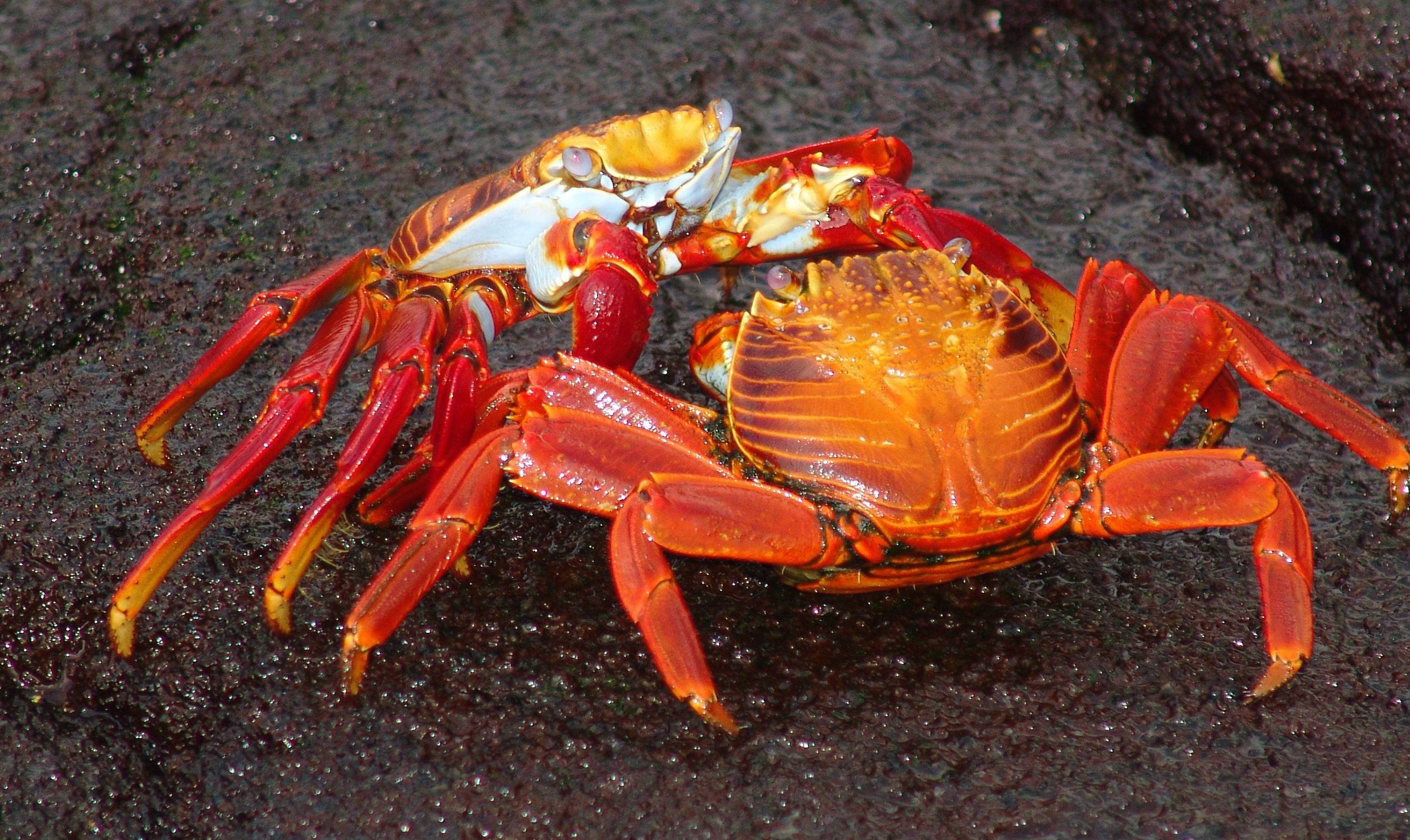
Bestiaries were traditionally works of observation and natural history. Ancient and widespread, their way of observing allowed room for elements of theology, symbolism, and moralizing that strike our modern ear as wildly unscientific. The animals in these old works were not seen in isolation, but in relation to the human sphere. They carried messages and lessons, and had a rightful place in a greater order.
Our own day has brought more detailed facts about animals and a less secure context for the new information. As we learn more about them, can the animals still teach us? We asked our contributors to listen to an animal which has always interested them. Their responses testify to the many levels of relationship which still endure. For the rest of the essays, click here.
–The Editors
On a mess of greenish-brown seaweed there is a rock crab; ocean water still gleams on his shell. He is all matter, all substance and accidentia, a sort of heavy down-falling of primitive ljght. The careless mottling on top suggests desert forts, where the sun hangs in the sky.
When a hand reaches out and turns it over, we see the underside, fierce, like the underside of the desert. The six claws folded over the stomach are jointed segments of what has to be done, fierce bits of necessity. The will is strong, living without mother or father, bony, unsentimental, even on the upper legs that slope like arms. Inside the girlish arms there is cold and muscular flesh, still visionary, washed at night when seawater carries its moony splashings through the claw tunnel.
When we smell it, we feel vulnerable, as when we understand an image in a dream, and an instant later fall into night, grief, laboratory coldness, the fierce salt of the dark.
The coarse grainy skin of the flounder makes one think of remarks made too coarsely, and too quickly. The color is the grayish pale brown of wolf paws. Its petulant, rubbery mouth widens gradually, and the flesh actually is an extension or widening of the mouth. The shape becomes a thick triangle; part way up, the fins begin and continue in thought, in architectural fantasy, what the flesh itself decided not to do. Then at the peak, the fins begin to slope off, and by diminishing, make a second triangle, sliding away toward the tail; and the tail too has its fin, a sort of afterthought.
The two eyes together on the upper side, poorly balanced on the crook of the nose, look sideways discouraged, unable to make the equation come out right. And the body’s oystery smell recalls a life lived utterly without ideas.
There must have been some violence to get those eyes twisted around to one side—probably violence from above. Whatever it was, the flounder ended floating along the ocean bottom, white side down, hoping not to be seen from above. The underside does not see the sun; it takes on the paleness of the cutworm, of the upper arms of women who always wear sleeved dresses.
It must be then that half of me remains on shore, with my long line and casting rod, and the other half is down there, so that what stands above remains attached to what floats down there.
Suppose Joseph had turned into a fish, and Egypt were a great river, then wouldn’t Joseph, after he had fled from the plantation manager’s wife, slipping away, naked, heading for the water, have glided about the legs of the fat cattle soon to rise from the river? …Moving slowly, as those fish whose long black feelers touch the muddy boulders. And if he became a man again, and slipped back into bed, would he be the brother on shore or the brother under the water?
The oyster looks impenetrable and thuggy, and is the size of a baby mountain lion’s paw. Its surface is flaky, breaking off, crazily staked with little abdominal errors. There are waves here, as on gypsy skirts-concealing what?
Hands, as they move to open it, feel grainy, about to violate a privacy. Small flakes of subtle calcium fall away…they are the grief and surprise that come away from lips closed so long. We have to call for a knife, which is the gift of those who lived before us, a strong knife, the end simple-minded but without Puritanism; it arranges its hard-ended molecules so as to recapture the past, gallop up the valley, return the dead to their former lives.
The oyster body wets the tip of the nose as one tries to gulp it up…the lips feel satisfied, as if they deserve what they have received.
And when we see the two empty shells, we feel it is right to praise the naked life. The shells are ready now to be thrown away into gardens, or thrown back into the ocean, as simple plates of desire.♦
From Parabola Volume 8, No. 2, “Animals,”Summer 1983. This issue is available to purchase here. If you have enjoyed this piece, consider subscribing
